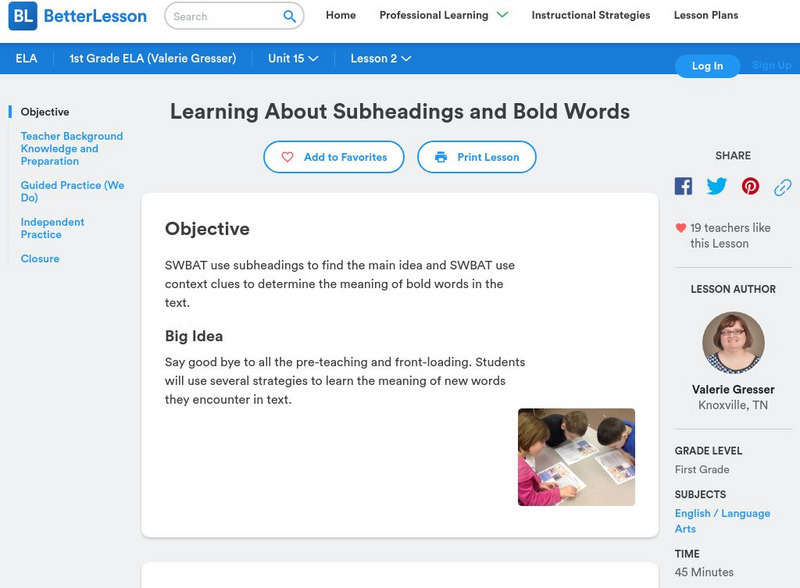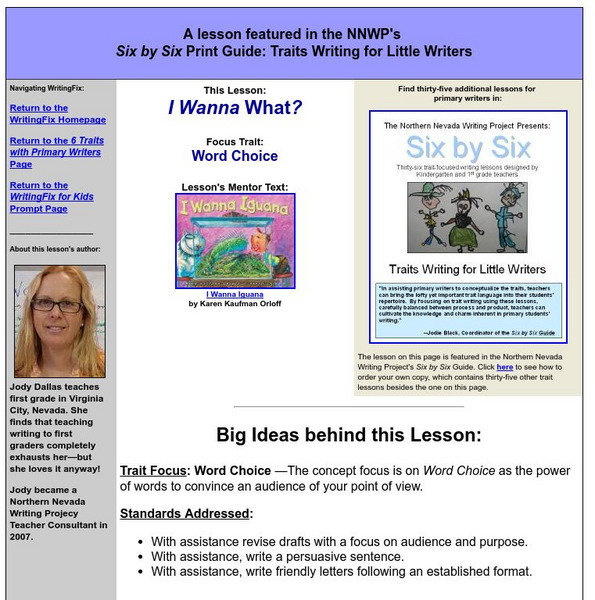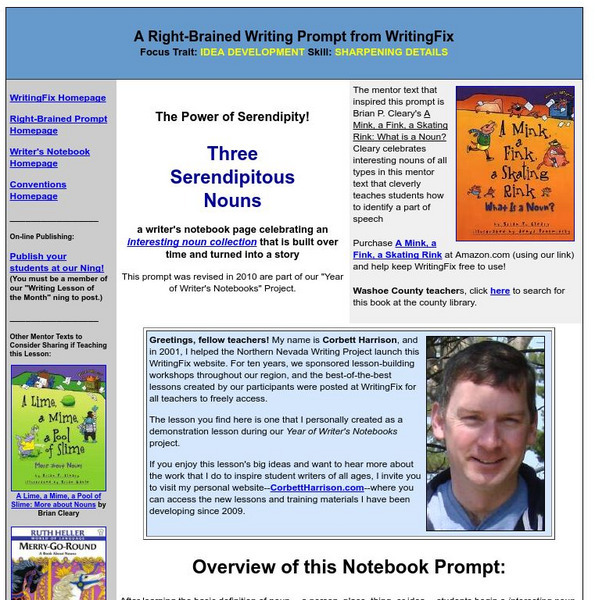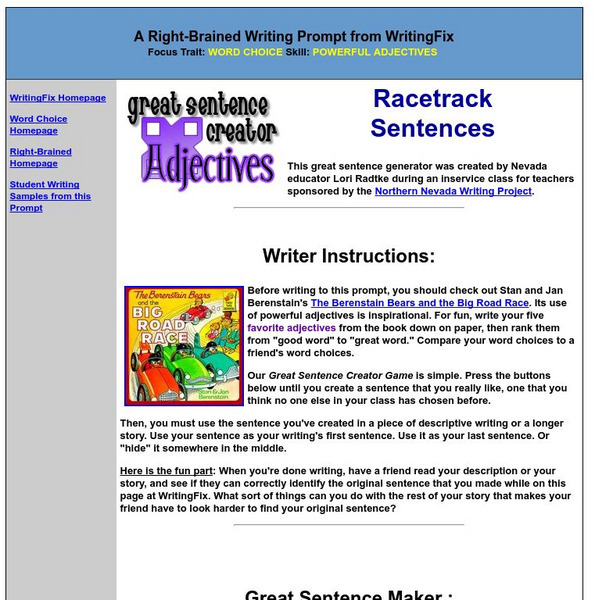Curated OER
Dinosaur Reading Comprehension
What is more interesting than a dinosaur; three dinosaurs! Second graders hone their reading comprehension skills by learning about the T-Rex, Pachycephalosaurus, and diplodocus. They read three short paragraphs and answer three...
Curated OER
Bread in a Bag
This lesson focuses on making bread, but also spends some time on the origins of wheat. In order to make the bread, each class member receives a kit full of the materials they will need. Included here is a detailed list of instructions...
Curated OER
Little Red Hen
Pupils listen to a teacher reading of The Little Red Hen, identify the story elements and sequence them. They talk about different jobs associated with providing food and act out a play based on the story. Be aware that although several...
Curated OER
My Rotten Red-Headed Brother
Students discuss family relationships after reading Patricia Polacco's book, My Rotten Red-Headed Brother.
Curated OER
They Sound the Same
In this homophones worksheet, 2nd graders use the homophones from the word box to complete each sentences. Students complete 6 sentences.
Curated OER
Truth or Hogwash
Explore the history of domesticated pigs and their important byproducts. After discussing the use of pigs, class members create game boards describing the animals. While playing the game, they determine if the answers are true or...
University of South Florida
Fcat Express: Probable Passage
Site provides extensive assistance in preparing 4th grade students for Florida Comprehensive Assessment Test. This section provides help in using the "probable passage" technique to aid comprehension. In addition, links are available to...
ReadWriteThink
Read Write Think: Using Parts of Speech to Write Descriptive Sentences
Students can easily grasp the the parts of a sentence with this lesson plan.
ReadWriteThink
Read Write Think: Word Recognition Strategies Using Nursery Rhymes
This lesson is a great way to teach students about rhymes and word recognition. This plan includes suggest nursery rhymes for you to use, and several supplementary sites to help you out.
Better Lesson
Better Lesson: Learning About Subheadings and Bold Words
In this lesson, students will use several strategies to learn the meaning of new words they encounter in text. The students will learn specific strategies so when they encounter new words, they can figure out the meaning of those words...
Better Lesson
Better Lesson: Identifying and Writing Opinions About Clouds Using Clue Words
It is important to teach students the difference between facts and opinions. This is the groundwork for getting students to think critically when analyzing a piece of text. This lesson will help to lay the foundation for opinion writing....
Better Lesson
Better Lesson: Learning to Recognize and Use Strong Verbs
In this lesson, students will listen to stories and determine the meaning of the word by using sentence-level context clues. They will think about the verbs that are used and think about how that verb appeals to their senses, giving them...
Other
Wisewire: Grade 3 Playlist: Clues to Unknown Words Using Known Roots
A dictionary is not the only way to figure out the meaning of new words. Readers also can look for familiar word parts. These word parts might appear in other words that readers already know. By looking for familiar word parts, including...
Writing Fix
Writing Fix: I Wanna What?
This lesson is centered on word choice and vocabulary and the book, I Wanna Iguana, by Karen Kaufman Orloff. Young students learn to grasp the difference between begging and persuading and apply this knowledge to their own persuasive texts.
Writing Fix
Writing Fix: If You Give a Student an Animal
For this lesson plan, the book If You Give a Moose a Muffin, written by Laura Numeroff, is used as a mentor text for word choice. The content focus of the lesson is to teach the learners to take ownership of scientific and descriptive...
Writing Fix
Writing Fix: Noun Inspired Animal Reports
In this lesson students will complete a report regarding an animal for science class. Vocabulary, nouns and verbs can be incorporated cross-curricularly.
Writing Fix
Writing Fix: The Wacky "I Will Not" Chalkboard
Students can use this writing idea from the book Wacky We-Search Reports by Barry Lane to demonstrate understanding in any content area. Students use the idea of writing "I will not " sentences to show their knowledge of various...
English for Everyone
English for Everyone: Sentence Completion 3 (Low Beginning Level) [Pdf]
English for Everyone provides a printable quiz to assess the recall of basic categories of nouns needed in beginning English.
English for Everyone
English for Everyone: Sentence Completion 7 (Low Beginning Level) [Pdf]
English for Everyone provides a printable quiz to assess the recall of basic infinitive verb phrases about "likes" that are needed in beginning English.
English for Everyone
English for Everyone: Sentence Completion 8 (Low Beginning Level) [Pdf]
English for Everyone provides a printable quiz to assess the recall of basic infinitive verb phrases about "likes" that are needed in beginning English.
Curated OER
Mc Graw Hill: Words That Describe the Senses
Learn about words in a story that describe feelings or the different senses.
Curated OER
Mc Graw Hill: Part 2 Reading Informational Text: Understand Precise Vocabulary
Learn how to use context clues to help you define precise vocabulary words that you may not know.
Writing Fix
Writing Fix: Three Serendipitous Nouns
In this lesson, the book entitled A Mink, a Fink, a Skating Rink: What Is a Noun? (Words Are Categorical), written by Brian P. Cleary, is used as the mentor text. After learning the basic definition of noun, a person, place, thing, or...
Writing Fix
Writing Fix: Racetrack Sentences
In this activity, The Berenstain Bears and the Big Road Race, written by Stan Berenstain, is used as a mentor text. Students will record their favorite adjectives from the mentor text, rank them according to their favorite, and share...




















